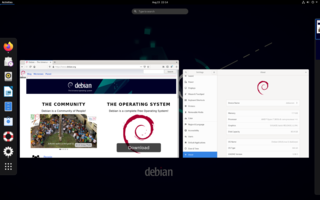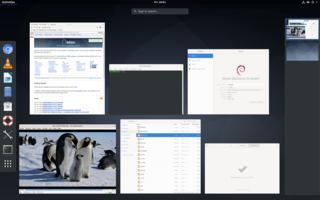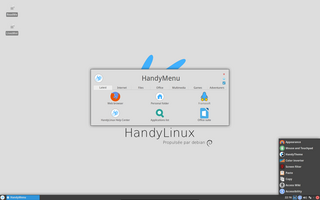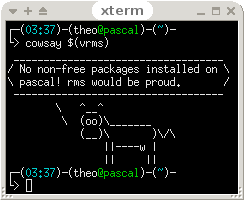 W
WDebian, also known as Debian GNU/Linux, is a Linux distribution composed of free and open-source software, developed by the community-supported Debian Project, which was established by Ian Murdock on August 16, 1993. The first version of Debian (0.01) was released on September 15, 1993, and its first stable version (1.1) was released on June 17, 1996. The Debian Stable branch is the most popular edition for personal computers and servers. Debian is also the basis for many other distributions, most notably Ubuntu.
 W
WAdvanced Package Tool, or APT, is a free-software user interface that works with core libraries to handle the installation and removal of software on Debian, and Debian-based Linux Distributions. APT simplifies the process of managing software on Unix-like computer systems by automating the retrieval, configuration and installation of software packages, either from precompiled files or by compiling source code.
 W
Waptitude is a front-end to APT, the Debian package manager. It displays a list of software packages and allows the user to interactively pick packages to install or remove. It has an especially powerful search system utilizing flexible search patterns. It was initially created for Debian, but has appeared in RPM-based distributions as well.
 W
WCanonical Ltd. is a UK-based privately held computer software company founded and funded by South African entrepreneur Mark Shuttleworth to market commercial support and related services for Ubuntu and related projects. Canonical employs staff in more than 30 countries and maintains offices in London, Austin, Boston, Shanghai, Beijing, Taipei, Tokyo and the Isle of Man.
 W
Wdebconf is a software utility for performing system-wide configuration tasks on Unix-like operating systems. It is developed for the Debian Linux distribution, and is closely integrated with Debian's package management system, dpkg.
 W
WThe Debian System is a 2005 non-fiction book written by Martin Krafft which deals exclusively with Debian Linux, detailing its internal workings. The book is mostly for the experienced users seeking in-depth technical knowledge, rather than for beginners.
 W
WDebian releases do not follow a fixed schedule. Recent releases have been made roughly biennially by the Debian Project.
 W
WDebian-Installer is a system installer designed for the Debian Linux distribution. It originally appeared in the Debian release 3.1 (Sarge), released on June 6, 2005, although the first release of a Linux distribution that used it was Skolelinux (Debian-Edu) 1.0, released in June 2004.
 W
WEmmabuntüs is a Linux distribution derived from Ubuntu/Debian and designed to facilitate the repacking of computers donated to humanitarian organizations like the Emmaüs Communities.
 W
WGNUPanel is a hosting control panel for Debian. It is written in PHP and it is tailored to run on 32 and 64-bit Debian Linux web hosting servers. The administrator can create public and private hosting plans, accept PayPal, Cuentadigital and Dineromail payments, send messages to users, create redirections, use an integrated support ticket system, control bandwidth, disk space and define policies for account suspension. It provides the usual functions to create mail and FTP accounts, databases, directory security, etc. Additional functionality is included for domain parking and subdomain control over PHP directives including safe_mode and register_globals. GNUPanel stores its configuration in a PostgreSQL 9.1 database and provides three web interfaces with SSL access. User, reseller and administrator accounts may be created.
 W
WHandyLinux is a Linux distribution originating in France and derived from the Debian stable branch. It is designed especially with inexperienced computer users in mind. The distribution has low system requirements, allowing it to be used on a range of older hardware that is no longer supported by the latest versions of proprietary operating systems. It is aimed particularly at older people with dated hardware who do not need or possess the skill to use many features afforded by state-of-the-art operating systems. It may also be useful for computer users with disabilities, such as visual impairment.
 W
WJigdo is a utility typically used for downloading to piece together a large file, most commonly an optical disk image such as a CD, DVD or Blu-ray Disc (BD) image, from many smaller individual constituent files. The constituent files may be local and/or retrieved from one or more mirror sites. Jigdo's features are similar to BitTorrent, but unlike BitTorrent, Jigdo uses a client-server model, not peer-to-peer.
 W
WOpenMediaVault (OMV) is a free Linux distribution designed for network-attached storage (NAS). The project's lead developer is Volker Theile, who instituted it in 2009. OMV is based on the Debian operating system, and is licensed through the GNU General Public License v3.
 W
WSoftware in the Public Interest, Inc. (SPI) is a US 501(c)(3) non-profit organization formed to help other organizations create and distribute free/open-source software and open-source hardware. Anyone is eligible to apply for membership, and contributing membership is available to those who participate in the free software community.
 W
Wvrms is a program that analyzes the set of currently installed packages on a Debian-based system, and reports all of the packages from the non-free tree which are currently installed. Software gets placed in the non-free tree when it is agreed not to be too problematic for Debian to distribute but does not meet the Debian Free Software Guidelines and therefore cannot be included in their official distribution. For each program from "non-free" installed, vrms displays an explanation of why it is non-free if one is available.
 W
W